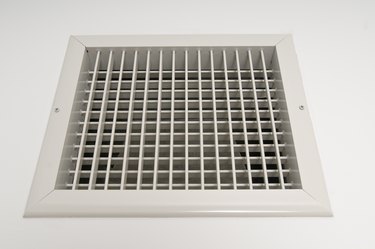
Oil furnaces burn heating oil to produce warm air that circulates throughout your home. This is an alternative fuel for homeowners who don't have access to natural gas utilities or prefer the option of burning oil. However, oil furnace systems have unique dangers. A furnace that leaks oil while running can present serious risks until you repair it.
Reasons
Video of the Day
An oil furnace may leak fuel while it runs for a number of reasons. Leaks can result from damage to the oil pump or the filter through which oil passes before burning. A ruptured oil feed line will also produce a leak. Faulty valves and gaskets, which are meant to provide a tight seal when the fuel passes from one line or reservoir into another, are responsible for some leaks. Finally, a puncture or open seam in your fuel tank will produce a leak that flows regardless of whether your furnace is running or not.
Video of the Day
Dangers
Fuel oil leaks present several dangers, all of which are potentially hazardous to you and your family. While an oil furnace's burner is contained away from the fuel supply, a spark or flame from another source can ignite fuel oil on the floor, causing a home fire that can spread quickly. Fuel oil is also extremely slippery and can cause slips and falls if it coats a basement floor. Outdoor leaks from the fuel tank contribute to environmental contamination.
Repairs
Repairing a leaking oil furnace is a relatively straightforward task, though it does require special materials. It is possible to plug leaks and allow the furnace to continue operating without replacing components or paying for professional repairs. Materials such as Teflon tape won't seal ruptured lines or leaking gaskets. Instead, you need a sealing compound specifically formulated to resist oil. More serious leaks may require replacing gaskets and fuel lines, or even the entire fuel tank assembly.
Tips
Before having your oil furnace's fuel tank filled each year, carefully inspect the entire system. Looks for signs of physical damage as well as deterioration due to age. Inspect the furnace and fuel system again at the end of the heating season to ensure that heavy use hasn't led to any visible problems. Keep sources of sparks and flames away from your furnace and fuel tank at all times, even when there aren't leaks.